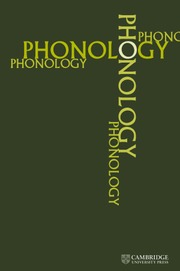Article contents
More on English vowel shift: the back vowel question
Published online by Cambridge University Press: 20 October 2008
Abstract
One of the pivotal claims of the generative approach to English phonology is that a rule essentially duplicating the historical changes of the English Great Vowel Shift is a part of the phonological competence of contemporary speakers of the language (Chomsky & Halle 1968). Though experiments designed to test this claim have shown that some of the alternations predicted by such a rule (VSR) are at least marginally productive for speakers, a counter-claim has also been proposed (Moskowitz 1973; Jaeger 1980) that this limited productivity is the result of knowledge of the familiar spelling rule (SR) that relates the ‘long’ vs. ‘short’ pronunciations of the five English vowel letters.
A comparison between the phonological and orthographic theories shows that certain back vowel alternations are crucial for distinguishing between them, and that certain others critically distinguish the Chomsky & Halle version of the VSR from the more recent reformulations of Halle (1977) and Halle & Mohanan (1985). A concept formation experiment was therefore conducted to determine which of these back vowel alternations were included in the vowel shift set. The results showed that all of the predictions of the SR were confirmed, whereas all three versions of the VSR were falsified on at least one count. Moreover, data from English spelling–sound regularities also proved to be highly predictive of the gradation of the responses found in this study, lending rather conclusive support to the view that the SR is responsible for all that has been found to be productive about the vowel shift phenomenon.
- Type
- Research Article
- Information
- Copyright
- Copyright © Cambridge University Press 1986
Footnotes
H. S. Wang is currently affiliated to the National Tsing Hua University, Hsinchu, Taiwan, ROC.
References
- 6
- Cited by


